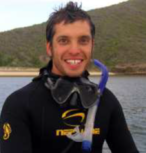DNA reveals the past and future of coral reefs
New DNA techniques are being used to understand how coral reacted to the end of the last ice age in order to better predict how they will cope with current changes to the climate. James Cook Univer

From 2005 to 2022, the main node of the ARC Centre of Excellence for Coral Reef Studies was headquartered at James Cook University in Townsville, Queensland (Australia)








Abstract:
Outbreaks of crown-of-thorns starfish (COTS) are a major driver of coral decline across the Great Barrier Reef (GBR) and compound upon the impacts of increasingly frequent and severe coral bleaching events and cyclones. The primary objective of the COTS Control Program is to suppress outbreaks and protect coral at focal reefs and across regions through strategic management action. The Program was established in 2012 following the initiation of the current outbreak and it has progressively improved and expanded over the past decade to effectively and efficiently manage COTS outbreaks and protect coral across entire reefs and regions. The Program is underpinned by data-driven decision support tools and the bestavailable knowledge, to prioritise and target reefs for COTS management, and to optimally deploy surveillance and cull effort. It is the largest-scale intervention program on the GBR today and it builds upon and strengthens foundational management actions, including Marine Park Zoning. The Control Program actively partners with the research community and key stakeholders, to continuously improve and achieve greater outcomes for the health and resilience of the Great Barrier Reef. In this presentation we will highlight Program insights, outcomes and knowledge gaps from a management perspective.
Bio:
David is a marine scientist with expertise in coral reef ecology, fisheries biology, marine conservation research and management. He graduated with a Bachelor of Science from James Cook University (JCU) in 1996 and spent the next decade working on government, academic and industry sector research projects in Australia, Papua New Guinea, Indonesia and the Pacific Islands. He later returned to JCU and spent several years investigating the ecological effects of no-take marine reserves on coral reefs, before graduating with a PhD in 2009. David went on to continue his research during a post-doctoral fellowship at the ARC Centre of Excellence for Coral Reef Studies between 2010 and 2015, where he designed and coordinated research projects focused on marine reserves, biodiversity conservation, fisheries management and larval connectivity. After several years back in the private sector, David is currently working with the Great Barrier Reef Marine Park Authority where he is the Assistant Director of the Crown-of-thorns Starfish Control Program. He has authored over 80 scientific publications and reports and delivered presentations at numerous academic, government, industry and stakeholder conferences in Australia and internationally.
New DNA techniques are being used to understand how coral reacted to the end of the last ice age in order to better predict how they will cope with current changes to the climate. James Cook Univer
A new study on the effects of climate change in five tropical countries has found fisheries are in more trouble than agriculture, and poor people are in the most danger. Distinguished Profess
James Cook University researchers have found brightly coloured fish are becoming increasingly rare as coral declines, with the phenomenon likely to get worse in the future. Christopher Hemingson, a
Researchers working with stakeholders in the Great Barrier Reef region have come up with ideas on how groups responsible for looking after the reef can operate more effectively when the next bleaching
Abstract: As marine species adapt to climate change, their heat tolerance will likely be under strong selection. Individual variation in heat tolerance and its heritability underpin the potential fo
Abstract: The Reef Ecology Lab in KAUST’s Red Sea Research Center explores many aspects of movement ecology of marine organisms, ranging from adult migrations to intergenerational larval dispersal
Abstract: Macroalgal meadows are a prominent, yet often maligned component of the tropical seascape. Our work at Ningaloo reef in WA demonstrate that canopy forming macroalgae provide habitat for ad
Abstract: Sharks are generally perceived as strong and fearsome animals. With fossils dating back at least 420 million years, sharks are not only majestic top predators but they also outlived dinosa
Abstract: Connectivity plays a vital role in many ecosystems through its effects on fundamental ecological and evolutionary processes. Its consequences for populations and metapopulations have been
Abstract: Evolution of many eukaryotic organisms is affected by interactions with microbes. Microbial symbioses can ultimately reflect host’s diet, habitat range, and even body shape. However, how
Abstract: The past few years have seen unprecedented coral bleaching and mortality on the Great Barrier Reef (GBR) but the consequences of this on biodiversity are not yet known. This talk will expl